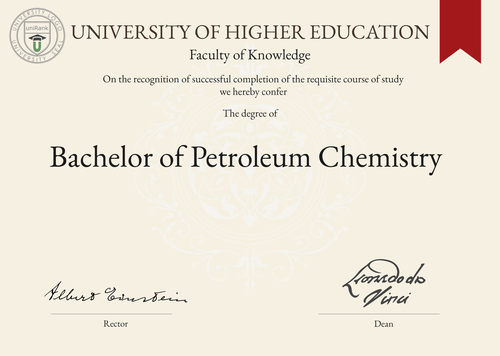
Bachelor of Petroleum Chemistry (BPC)
Guide to Bachelor of Petroleum Chemistry Program/Course/Degree
Bachelor of Petroleum Chemistry (BPC)

Program Name:
Bachelor of Petroleum ChemistryProgram or Degree abbreviation:
BPCDuration range:
The duration of the Bachelor of Petroleum Chemistry program typically ranges from 3 to 4 years.Tuition range:
The tuition fees for the Bachelor of Petroleum Chemistry program can vary depending on the chosen country or university. It is recommended to check with specific institutions for accurate information.Overview:
The Bachelor of Petroleum Chemistry program is designed to provide students with a comprehensive understanding of the chemical processes involved in the exploration, extraction, refining and utilization of petroleum resources. Students will gain knowledge in various areas such as organic chemistry, thermodynamics, petrochemical engineering and environmental science.Curriculum Overview by year:
- Year 1: Introduction to Chemistry, Mathematics for Chemists, Organic Chemistry Fundamentals - Year 2: Physical Chemistry, Analytical Chemistry, Petroleum Geology - Year 3: Petrochemical Engineering, Petroleum Refining, Environmental Chemistry - Year 4: Advanced Petroleum Chemistry, Research Project, Industrial InternshipKey Components:
- Organic Chemistry: Understanding the structure, properties and reactions of organic compounds found in petroleum. - Petrochemical Engineering: Learning the engineering principles involved in the processing and production of petrochemicals. - Petroleum Refining: Studying the techniques and processes used to refine crude oil into various petroleum products. - Environmental Chemistry: Exploring the impact of petroleum-related activities on the environment and developing sustainable solutions.Career Prospects:
Graduates of the Bachelor of Petroleum Chemistry program can pursue various career paths in the petroleum industry. They may work as petroleum chemists, petrochemical engineers, environmental consultants, research scientists, or quality control analysts in oil refineries, petrochemical plants, government agencies and research institutions.Salary Expectations:
The salary expectations for individuals with a Bachelor of Petroleum Chemistry degree can vary depending on factors such as job position, location and industry. Generally, professionals in this field can earn competitive salaries, with opportunities for growth and advancement. For a more accurate understanding of salary expectations, you can utilize the Job Sites Search Engine, from our sister site jobRank, which searches over 4,600 job sites worldwide. Make sure to specify not only the job title but also the country you are interested in.Conclusions:
It is important to note that the duration, tuition fees, curriculum, key components, career prospects and salary expectations of the Bachelor of Petroleum Chemistry program can vary depending on the chosen country or location for studying the program, as well as the specific university. Prospective students are advised to research and compare different institutions to find the best fit for their educational and career goals. Visitors can search for universities offering the Bachelor of Petroleum Chemistry program worldwide through the uniRank World Universities Search Engine, which provides comprehensive information on universities and their programs.World Universities Search Engine
search for Bachelor of Petroleum Chemistry (BPC) and add the Location (country, state etc.) or specific University you are interested in studying at.
Query examples:
- Bachelor of Petroleum Chemistry (BPC) United States
- Bachelor of Petroleum Chemistry (BPC) United Kingdom online
- Bachelor of Petroleum Chemistry (BPC) Australia international students
- Bachelor of Petroleum Chemistry (BPC) University of California
- Bachelor of Petroleum Chemistry (BPC) University of London tuition fees
- Bachelor of Petroleum Chemistry (BPC) University of Sydney scholarships
Share Program/Course
Interesting? Share this program/course/degree info with your friends now.